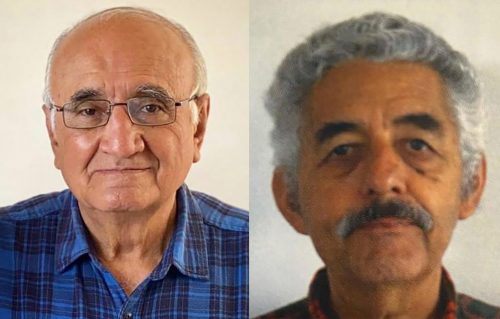By David Agren | Catholic News Service
MEXICO CITY (CNS) — The Mexican bishops’ conference called on the country’s president to revise his security strategy as violence continues convulsing Mexico and claiming innocent lives, including clergy.
The bishops’ statement followed the slayings of two Jesuits and a person they were protecting in their parish — a crime attributed to a local crime boss in a part of the country dominated by drug cartels, rife with poverty and long neglected by the state.
“Crime has spread everywhere, disrupting the daily life of our entire society, affecting productive activities in cities and the countryside, exerting pressure with extortion against those who work honestly in markets, schools and small businesses, along with medium and large companies. (Criminals) have taken over the streets, neighborhoods and entire towns, as well as roads and highways,” the bishops said in their June 23 statement.
“Most seriously, (criminal groups) have expressed themselves through levels of inhuman cruelty in executions and massacres that have made our country one of the most insecure and violent places in the world.”

Jesuit Fathers Javier Campos Morales and Joaquín César Mora Salazar died defending their parish in Cerocahui, in the Copper Canyon of Chihuahua state, which serves the Indigenous Tarahumara population.
The priests had opened the parish to a person fleeing a kidnapping June 20, according to Chihuahua investigators, but an armed individual burst inside and killed that person — identified as Pedro Palma, a tour guide.
Jesuit Father Javier Ávila, a prominent human rights defender in Chihuahua state, subsequently told multiple Mexican media outlets that one of the priests immediately rushed to provide “spiritual assistance” to the victim and was killed. A second priest approached the gunman, saying, “calm down,” and also was killed. A third priest intervened, but was not attacked, according to Father Ávila’s version of events given to the newspaper Reforma. The attacker subsequently took the three bodies from the parish.
Father Ávila later told journalist Pascal Beltrán del Río that the gunman had been baptized by Father Campos.
Chihuahua state officials said they found three bodies June 22. The Jesuits confirmed June 23 that two of the bodies were those of Fathers Campos and Mora.
Mexican authorities named a local crime boss, José Noriel Portillo Gil, as the suspect in the slayings and offered a reward of 5 million pesos (US$250,000).
Palma, the tour guide, was kidnapped and apparently escaped from Portillo’s custody and ran into the church. Two other individuals also were abducted by Portillo after an altercation with him earlier the same day, according to the prosecutor.
The slayings drew outrage from Jesuits and the wider Mexican society as yet another atrocity in the country’s unrelenting violence.
“Acts like these are not isolated,” the Jesuits’ Mexican province said in a June 21 statement. “The Sierra Tarahumara, like many other parts of the country, confronts conditions of violence and neglect which have not been reversed. Every day, men and women are arbitrarily deprived of life, as our brothers (who) were murdered.”
“The Jesuits of Mexico will not remain silent in the face of the reality that lacerates the entire society,” the Jesuits said. “We will continue to be present and working for the mission of justice, reconciliation and peace, through our pastoral, educational and social projects.”
Father Arturo Sosa, Jesuit superior general, said via Twitter: “I am shocked and saddened by this news. My thoughts and prayers are with the #Jesuits in #Mexico and the families of the men. We have to stop violence in our world and so much unnecessary suffering.”
At least seven Mexican priests have been killed since December 2018, when President Andrés Manuel López Obrador took office, according to the Catholic Multimedia Center in Mexico City.
López Obrador has promoted a poorly understood security policy of “hugs, not bullets,” though violence continues tearing through many regions of Mexico. He also has blamed the policies of his predecessors for provoking the violence.
Mexico’s bishops called for a different approach.
“It’s time to review security strategies that are failing. It is time to listen to citizens, to the voices of the thousands of relatives of victims and of the murdered and disappeared (and) the police officers killed by criminals,” the bishops said.
“We believe it is not useful to deny reality and blame the past for what we have to resolve now. Listening to each other doesn’t make anyone weak; to the contrary, it strengthens us as a nation.”
López Obrador insisted he would stay the course on security, saying in his June 23 news conference, “When they say, ‘change security strategy,’ No!” he said, adding, “You cannot confront violence with violence.”
The Jesuits have a long history of working in the Diocese of Tarahumara, which covers Copper Canyon. The region is home to the Indigenous Rarámuri people, also known as Tarahumara.
Father Campos, nicknamed “El Gallo,” was born in Mexico City and joined the Jesuits at age 16. He had worked with the Jesuit mission in the Sierra Tarahumara for 34 years, serving as vicar for the diocesan Indigenous ministry and as regional adviser for ecclesial base communities.
Father Mora, nicknamed, “El Morita,” was born in Monterrey and also joined the Jesuits at age 16. He served in the Sierra Tarahumara for 23 years and worked for a period with the Jesuit mission in southern Chiapas state.
The man accused of killing the priests reputedly terrorized the region, controlling drug running, illegal logging and liquor sales, according to statements from priests and press reports.
Father Ávila and other Catholics in the region have told the media they stayed silent after the slayings due to safety concerns. Father Ávila had to receive state protection after denouncing the enduring impunity of a 2008 massacre that claimed 13 lives at a party in the municipality of Creel, a departure point for tourists visiting the Copper Canyon.






















